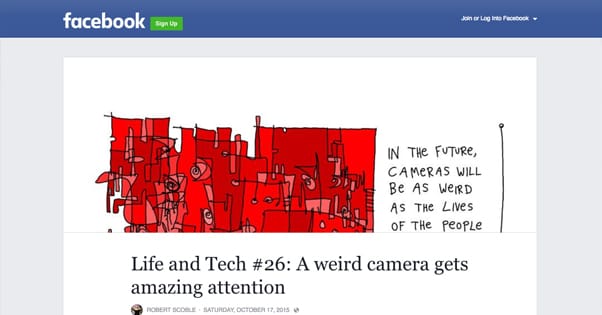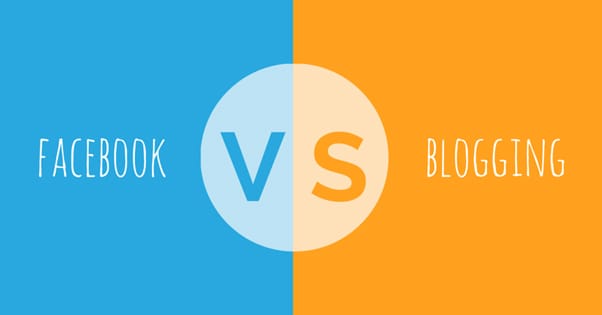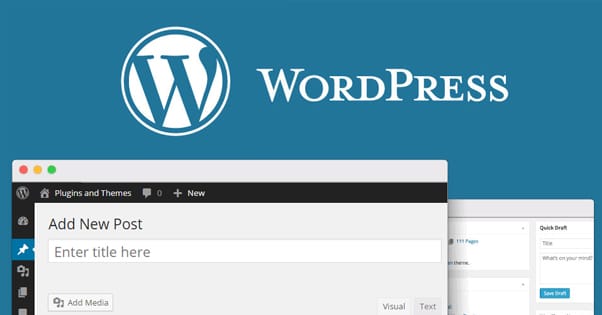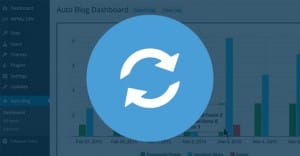Is Blogging Better than Posting to Facebook?
Published by James Parsons • Content Marketing • Posted December 8, 2016 ContentPowered.com
ContentPowered.com
Posting to Facebook and posting to your blog are, at first glance, very different things. Businesses can be successful doing just one or the other, and most businesses find success doing both. However, there’s more variance to the question than you might expect.
Posting to a Blog
The default mode of web marketing for most brands is the blog. There are thousands of case studies about why brands need blogs out there, with literal decades of research backing it up. Sure, some brands are able to grow on Facebook, but eventually even they turn to blogs. Just look at IFLS, which started as a Facebook page and eventually expanded into a news site as well. They leveraged their social popularity to get a more stable platform under their control up and running.
A blog is a way to get large quantities of content up and running, where it can be indexed by Google and where you can control it. Control is probably the biggest selling point, as well. With a blog, you own the site and can change the design, the framework, the marketing, the monetization, and anything else about it that you could want to change. With posting to Facebook, you’re limited in all of those things. More on that later.
Blogs are an excellent base for content because it all exists indefinitely. Sure, some of the content is going to be time-sensitive and not valuable in the future, and it will drop off in utility, but it can still earn you links and be a hub for valuable links. The links are still valuable to you even if they drop off in traffic referrals.
Blogs can be monetized, which is a major boon over Facebook. Your means of monetizing Facebook are extremely limited, generally coming down to linking to your site or linking directly to affiliate offers. You can run a storefront on Facebook, but honestly, when was the last time you actually saw someone doing that? I haven’t seen it in ages, myself.
Facebook also truncates lengthy content, which means it’s harder to post long-form blog posts and informative tutorials without losing readers. Most browsers on Facebook aren’t going to click “Read more” to expand the article, which is why the ideal length of a Facebook post is a mere 40 characters.
Blogs give you complete control over the type of content you post, including various scripts, multimedia inclusions in various formats, and a host of quality of life features. You don’t have to worry about not being able to run a script, needing to adhere to the terms of service of a social network, or anything of the sort. The only restrictions you have are placed on you are national and global laws, web host terms of service, and restrictions from ad networks you’re trying to use.
Posting to Facebook
Posting to Facebook comes in three forms. The first one, which I’ll primarily discuss in this section, is the simple organic post. It’s the default mode of communication for your Facebook page, in much the same way that wall posts are the default for a personal profile. It’s limited in that you can “only” post updates up to 63,000 characters long, but again, the ideal length is far under 100.
Facebook has some useful features for posts, but they tend to all revolve around media inclusion. If you want an image attached to your post, you need to make it a photo post, in which case your “post” is just the description of the image. You can’t pepper images throughout a post like you can with a blog post. You can post videos, but again, they become the centerpiece.
Links become tricky as well. You have to paste a link in raw, you can’t use HTML to format it with an anchor text of your choice. When you paste in a link, as well, Facebook will pull meta data and turn your post into a link post. If the link is incidental to what you wand to post, you will have to remove this preview, otherwise it looks like you’re putting a heavier advertising emphasis on the link than you are. Multiple links have similar issues to multiple images; while you can include them, you either have one set of meta data or zero, nothing else.
There are no display ads on Facebook, at least not in a way you can monetize. Ads exist, but they’re for you to buy exposure to your posts, not for you to make money. The only way to make money directly from Facebook is to run affiliate links and hope you make more than you spend to promote them.
Facebook advertising is one benefit posts have over blog entries, however. Any time you make a post that you think should have more engagement, or post a link that you think should get more clicks, you can boost it. Boosting it turns it into an advertisement – and you can create advertisements that look like posts, for the opposite effect – to get more exposure. Different ad objectives give you different benefits, so for example you can pay to get more likes, shares, and comments on your post, or you can pay to get more link clicks, or more views to a video, and so forth. However, these are all paid options, so you need to have the budget to make use of it.
Posting directly to Facebook is also subject to the Facebook filter, called EdgeRank. This determines who amongst your audience can see your post. Most brands hover around 6% of their audience, so only 6 people out of every 100 who follow you are likely to see your post. This number is higher the fewer followers you have, but as you grow it will drop.
Facebook’s algorithm is tricky to manipulate. Text posts are the bottom of the totem pole, and will get the least exposure. Time is also a huge factor, and older posts get little or no visibility whatsoever.
Facebook is also not directly indexed by Google, at least not on a wide scale. The same sort of time filtering is in place as well, so Google is highly unlikely to serve people with older social media posts, under the assumption that they’re no longer valuable. If you want to show up on Google for specific pieces of content, you virtually need to have a high quality blog.
Facebook Notes
Facebook has a notes system which is sort of like a blog based on Facebook, except not really. It’s a strange system, and it’s something of a relic of the past, very rarely used these days. Even though Facebook rolled out an update to them relatively recently, they’re still a legacy system and few people bother with them.
What notes do is create something like a blog post entry on Facebook. Here’s an example of one in action. You can see a header photo at the top, along with a title, author byline, and date posted. You scroll down and you see typical features of a blog post, including paragraphs without truncation and links that have anchor text. Below it you see comments, specifically Facebook comments obviously enough.

Two things you don’t see, however, are social sharing buttons and embedded images. You can’t use images the same way you can use them on a blog, you only get one, and that one is your header. You also can’t promote other social networks via a button plugin, though nothing stops you from linking to your other profiles in your text.
Now let’s look at something else: a note from the New York Times. See the difference between the two? This one doesn’t have a cover photo, though it does have a large embedded image at the top. It has links, but no author byline. Now let’s take a look at the NYTimes Page. Where are the notes? If you wanted to view notes from the past, you would have to find the notes entry in the left sidebar and click it to be brought to the notes feed.
This is by far the primary drawback of notes. They’re still hidden away as a side feed, not something given much promotion whatsoever. You can’t even turn a note into a promoted post, you have to make ads that link to them as a website destination, which is a clunky workaround. It’s worse for personal profiles publishing notes, who only have one location for them in the top bar and only in replacing another app tab up top.
Notes may not be truncated the way long organic posts are, but they’re hidden away behind their own drawbacks.
Facebook Instant Articles
Facebook has been slowly testing and rolling out a new feature that is sort of a combination of a blog and a note, called Instant Articles. They work in a way similar to the new personal notes, with author bylines and links, and they’re made to be responsive and visible easily on mobile devices. Perhaps more importantly, they can be monetized as part of Facebook’s display network, allowing you to make a little bit of money from your instant articles.
The trick is, instant articles aren’t actually unique content posted on Facebook, like notes. They’re essentially a copy of content posted on your website, formatted and coded as a fast loading alternative to creating a responsive design. They’re “published” on Facebook, but only in the sense that Facebook hosts a copy of them. It gets around duplicate content issues by canonicalizing your original post, so Google and other search engines know that the real version of the post is on your blog.
That’s right; instant articles, a Facebook blog-equivalent service, still requires you to have a blog of your own from which to pull the published content.
So, notes work as a sort of alternative for a blog, but they lack many of the features that make a blog valuable. Instant articles work like notes, but with added blog-like features like monetization, a mailing list call to action, and an RSS feed, but they require you to have a blog of your own.
At the end of the day, Facebook is generally going to be more of a supplement to your marketing than it is the core. A blog is simply too valuable.
- Blogs are more stable. Facebook is known to update their algorithm, change their layout, or even ban people at a moment’s notice. You don’t have to worry about any of those things with a blog, you can maintain a status quo quite easily. All you have to worry about are the few Google algorithm updates and the security updates for your site infrastructure.
- Blogs have a larger payoff. You can earn money directly and indirectly. Facebook doesn’t allow you to embed ads or monetize in any way other than through Instant Articles, and even those require you to have a blog as a base.
- Blogs benefit from SEO efforts, which help pull in more traffic from Google and the other search engines. Facebook is largely not indexed, or not searched high up on the ranks without special filters to search specifically through the social network, so the content you post directly on the site is much less valuable.
- Blogs last much longer as well. A blog post can be an evergreen resource for years, while a Facebook post has a steep drop-off and is virtually valueless after a week, and might as well not exist after a month.
- Blogs give you more control over who sees your posts. Your link outreach, your paid circulation, it’s all based on your budget and who you connect with. On Facebook, you always have to content with EdgeRank, which generally doesn’t want you to succeed, at least not without paying a good chunk of change to Facebook.
It’s all about control. On a blog, control is yours. On Facebook, it’s Facebook’s. You’re there at their whim. Invest in a blog.









That control selling point is beyond key James. Blogging is A1 as far as control, and going the self-hosted wordpress dot org route is hands down the best way to establish that control. Fab points dude.
Hi there, I have a question about blogging. I have a website I want doodle owners and doodle breeders to find. I have been posting on facebook doodle groups which was doing very well for a while but solely fb has started blocking me and some groups do not want any advertisment on their site. Some of them are blocking me as well. I have had 70 orders in 3 months which tells me plenty people if they found my website under golden doodle grooming would buy my guides. I am not doing this to make money but to help doodle owners. I charge only 5 or 10 dollars for the 2 guides I provide just to cover my web expense. Can you advice me on how to go forward from here. At this time I do not have a blog. only fb posting and instagram….let me know your thoughts! Thank you!
Hi Helen! You have to be careful about group posting, if your posts get flagged repeatedly for going against the group rules or being overly promotional, I can see it affecting your ability to post in those groups. Not all groups welcome advertisements or self-promotion. I recommend starting a Facebook fan page and building your own audience where you can post whatever you’d like. Occasionally putting a small amount of money into Facebook Ads may help as well. Good luck!